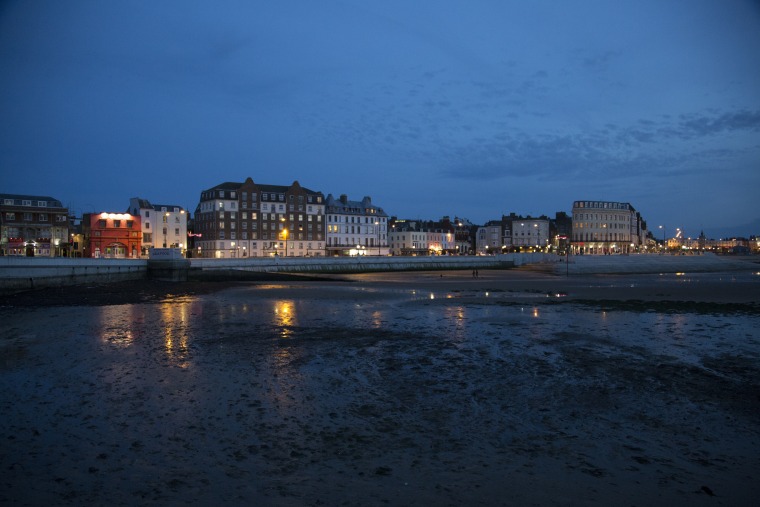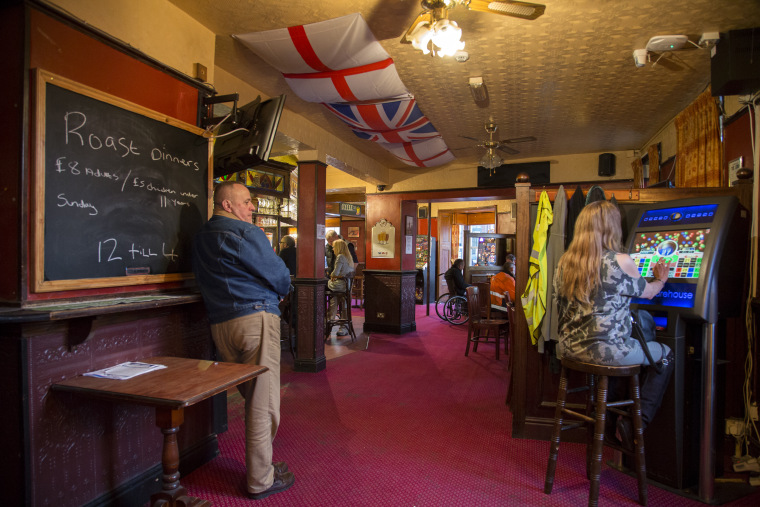MARGATE, England — Two words hit Nikola Cugova where it hurts: "Go home."
That phrase has been directed at the 37-year-old Czech national a lot since just over half of voters rejected keeping the U.K. in the European Union in last June's “Brexit” referendum.
“I hear English people say, ‘Now it’s Brexit, we’re leaving the EU, go home,’" said Cugova, who moved to the U.K. 13 years ago. "My children were small when they came here. My daughter doesn’t speak Czech and knows nothing about the Czech Republic."
Cugova lives in Margate, a struggling resort town that voted strongly for Brexit and has experienced economic hardships similar to those faced by U.S. rust-belt areas that embraced Donald Trump.
"We won two world wars, we don’t need anyone telling us what to do"
Polls indicate many pro-Brexit voters wanted to curb immigration, worrying about the pressure being put on public services such as schools and hospitals. The result left the 3.2 million EU nationals living in Britain facing an uncertain future in their adopted home.
There has also been a spike in reported hate crimes since the referendum, according to police figures.
The anxiety and animosity triggered by Britain’s shock decision were brought into sharp relief when NBC News recently met with residents at a community center.
Some in the 13-strong group vented their frustration at a pro-Brexit attendee.
“You always say, ‘You take our jobs.’ You know how many times I’ve seen people say, ‘Go back home’?” said Ludovit Gazi, a 46-year-old cleaning contractor originally from Slovakia.
That comment angered Mark Brigden, who supported quitting the EU.
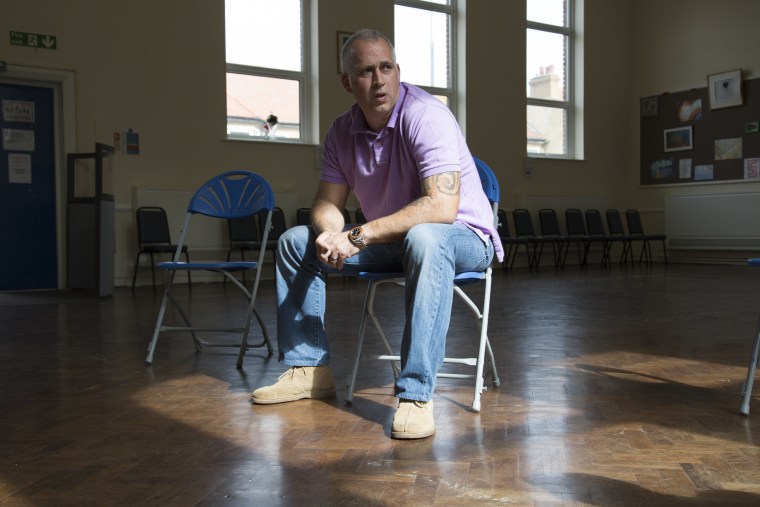
“That’s just because of a small number of small-minded people,” the 47-year-old shot back, arguing that Brexit could be a “catalyst for positive change” in Britain.
“We’re decried as people that we’re really not. It’s hurtful … I’m here today to show you that the face of Brexit is not some right-wing thing,” he said.
Drawing parallels between the U.S. and the U.K, Brigden added: “The American people voted for Trump. They’re sick of the establishment."
For some in Margate, Brexit appears to be golden opportunity to reverse the decline and take control of laws and borders from Europe back to the U.K.
At a pub festooned with U.K and England flags in the Cliftonville neighborhood — a formerly wealthy area that has fallen on hard times — customers were jubilant when Prime Minister Theresa May formally triggered a two-year countdown to a departure from the EU on March 29.
“It’s finally here,” said Paul Diggins, 50, a tattooed military veteran who is now unemployed and unable to work because of a bad back. "Just got our independence back so that we can make our own laws and manage our own security."
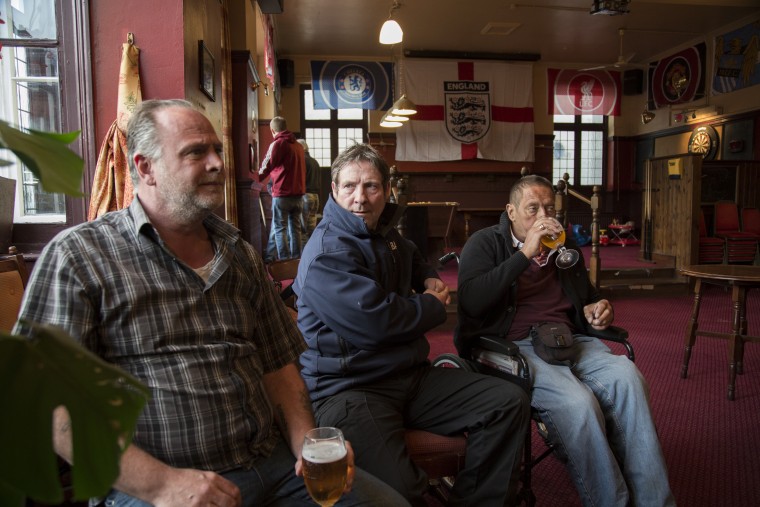
Drinkers at the pub said they had nothing against immigration and understood the need for migrant workers, but insisted that Britain must more tightly control the numbers. Unemployment in Thanet, the administrative district in which Margate lies, stands at almost double the national rate, according to statistics released earlier this month by the local government.
Diggins said he didn't like the amount of power possessed and wielded by the EU.
"We won two world wars, we don’t need anyone telling us what to do,” Diggins added as he sat at a table with friends. “We also need to control our borders. We’re only a small island, we cannot have all of Europe dumping all their people.”

Leaving the EU would allow Britain to set its own immigration levels, pub patrons argued, and leave the country more able to strike individual trade deals with the rest of the world. This should be easy given the country’s imperial past, they believe.
“We’ll be open to the world. We don’t have to be tied down to Europe,” said gas engineer Steven Price, 52, who warned of the EU turning into another Soviet Union-style superstate.
“Britain is Britain. We used to rule the waves,” Diggins said.
“We used to rule it all,” Price added.
An army of EU workers
Once a prosperous resort town with handsome guest houses and sandy beaches, Margate's economy was devastated by the rise of cheap foreign vacations in the 1970s that robbed the local tourism industry of visitors.
Faded arcades, fast-food joints and a struggling amusement park line the main bay-facing promenade, although trendy independent stores are beginning to pop up. Many former guest houses have been divided up to create cheap accommodation for the poor and unemployed.
Margate came to national attention when Nigel Farage, the former leader of the pro-Brexit U.K. Independence Party, targeted the area in his bid to be elected to Britain's Westminster Parliament in 2015. Farage lost — his seventh defeat in seven attempts — but went on to carve a role for himself as a cheerleader for Trump.
Around five percent of U.K. residents are citizens of other EU countries, according to 2015 data.
People from member countries are allowed to live and work anywhere they like within the 28-nation bloc. However, depending on the terms of Britain's departure, that could change.
A major concern for Britain's service economy is the fate of the army of EU workers who currently prop up the industry. Up to 24 percent of the workforce is made up of EU nationals and the sector needs some 62,000 new migrants per year, auditing firm KPMG said in a March report.
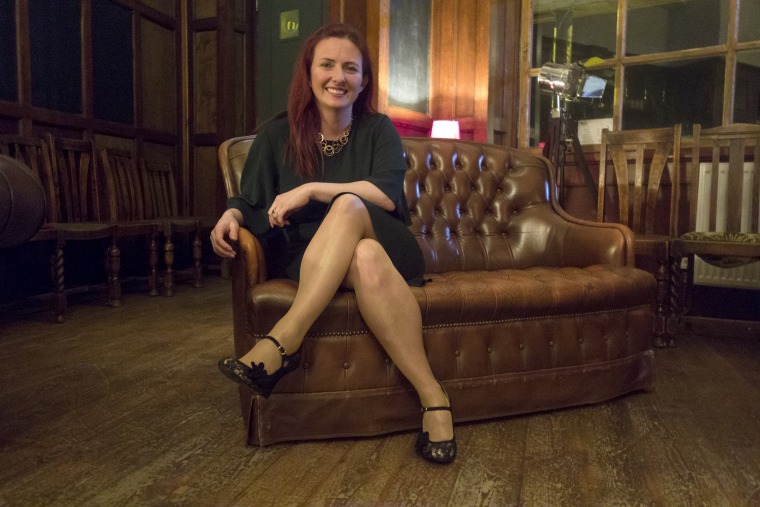
Allyson Jones, 38, runs Morgan’s, a 1920s-themed dance hall, bar and cafe, and is worried about Brexit’s impact.
“Finding staff is just so hard — and getting them to stay,” said Jones, who added that she has employed EU nationals because Britons tend to move on to new roles quickly. “Abroad the hospitality industry is a career, whereas here it seems to be very much something you do till you get another job.”
Morgan’s is one of the few bright spots in Margate’s main shopping area, which is otherwise blighted by boarded-up premises and dollar stores.
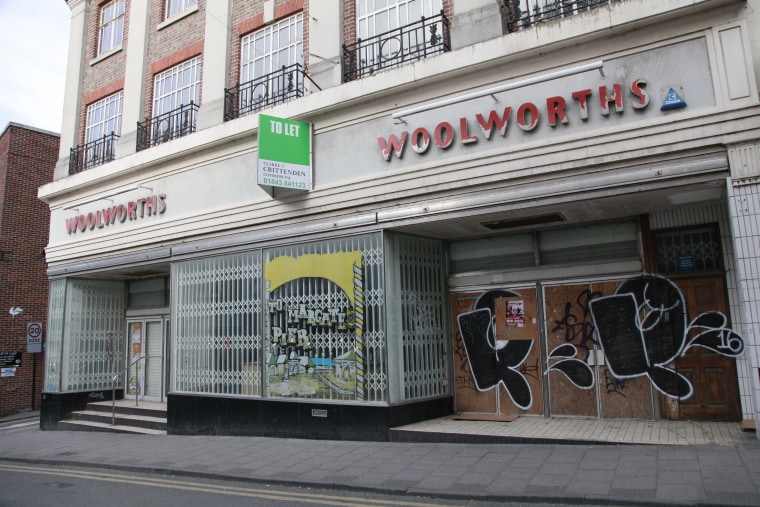
The pound has fallen some 20 percent in value against the dollar and around 14 percent against the euro currency since the Brexit referendum, which has led to higher prices for food and other goods.
"Everyone's sort of minding their pennies a little bit more,” Jones added.
Brexit 'brought out a really nasty side'
Agriculture makes up about 0.5 percent of Britain's national economy, contributing up to $13 billion each year. The sector is already suffering from an acute shortage of employees, leading the National Farmers’ Union to warn in February of food being left to “rot in the fields” if their members are not guaranteed access to EU workers after Brexit.

The fall in the value of the British pound has already made it less worthwhile for EU workers sending money back home. But hostility might be what finally chases these workers away, according to Alastair Brooks, who owns a fruit farm outside Margate.
The number of EU migrants coming to work in agriculture did not fall after a slide in the pound following the 2008 financial crash, he said.
“On the day of Brexit it brought out a really nasty side that I hope never to see again in Britain,” said Brooks, who employs up to 180 Europeans on a seasonal basis.
“We had to line up all our workers and say, 'We still love you,'” he recalled. “It was a terrible time for them. It was an awful message, particularly when they think they’re doing a good job. They’re working hard, they’re paying their taxes.”
